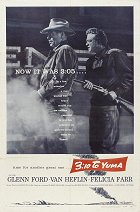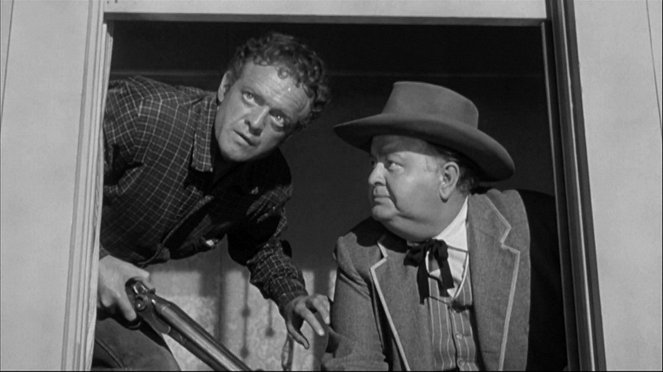Reżyseria:
Delmer DavesScenariusz:
Halsted WellesZdjęcia:
Charles Lawton Jr.Muzyka:
George DuningObsada:
Glenn Ford, Van Heflin, Felicia Farr, Leora Dana, Henry Jones, Richard Jaeckel, Robert Emhardt, Sheridan Comerate, George Mitchell, Robert Ellenstein (więcej)VOD (1)
Opisy(1)
This fine western opens with Van Heflin as a rancher whose family is suffering from the devastating effects of a long drought. Heflin needs $200 to build a well, then learns he can obtain the money as a reward for delivering Glenn Ford, a notorious outlaw now in the hands of the law, to the state prison in Yuma, Arizona. Though this will put Heflin in great personal danger, the peaceful man accepts the assignment, knowing what the money will mean to his family. Heflin and Ford hole up in a small hotel in another town while waiting for the train to Yuma. The outlaw begins toying with Heflin's mind, talking in a friendly manner about Heflin's job and financial situation. Playing psychological games, Ford tries to convince Heflin to take $100,000 to look the other way while he escapes. Heflin finds himself in a quandary, desperately needing the money yet being bound by his word to carry out the job. Ford's gang, led by Jaeckel, discovers where their leader is hidden and sets out to rescue him. The town officials abandon Heflin rather than put themselves in danger, leaving the troubled rancher alone to face off with the outlaws. Ford ends up assisting Heflin, helping his captor on the 3:10 to Yuma, explaining, 'I owed you that.' Heflin has come through the ordeal, body and integrity intact, and, as if in answer to this baptism by fire, the skies burst forth with rain, putting an end to the drought. (oficjalny tekst dystrybutora)
(więcej)Materiały wideo (1)
Recenzje (1)
The majority of the runtime maintains a reliable four-star level and ranks significantly higher than what American studios produced in the genre in the 1950s. It plays with a similar motif as the famous film High Noon. By coincidence, the responsibility for resolving the crisis situation falls on the lonely hero, who overcomes his fear at the decisive moment and becomes a moral authority. The film uses typical western characters but gives them a deeper psychological dimension compared to the customs of the time. In particular, the leader of the gang is not a typical western villain with a black soul and fast guns. He is a player, manipulator, tempter, and negotiator, but also the owner of a unique and solid value system. The film usually avoids using genre stereotypes, is sparing with action scenes, and focuses on the psychological conflicts between the characters and their dialogue. Unfortunately, in the last fifteen minutes, the western myth comes to life in full force, and suddenly we have a typical 1950s western with an invincible hero and a naive plot. The triumph of justice should have taken a different form, and the final scene of the transition from the hotel to the train is a typical example of the screenwriter bending logic in favor of their goal. In my eyes, the film deserves one star less for this, but a genre fan can easily add another star. Overall impression: 65%.
()


